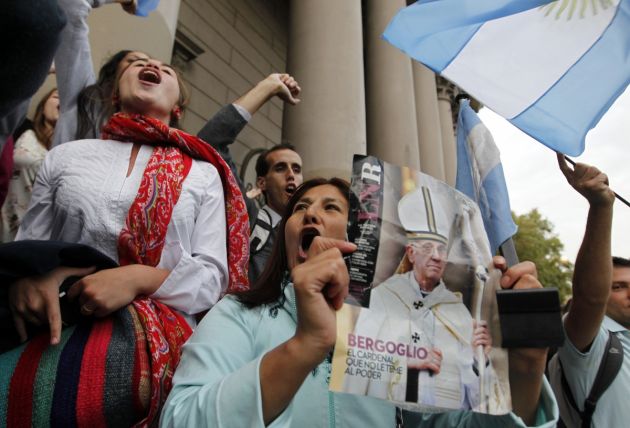Latin Americans cheer Pope Francis

Latin America is overjoyed to have its first pope.
He is also the first Pope Francis and Jesuit to lead the Roman Catholic Church.
Latin America is home to 40 percent of the world's Catholics. So its no great surprise that 115 carninal electors finally took notice of the large size of Latin Catholics outside Europe.
Pope Francis I sets an example to the rich by rejecting the trappings of luxury in an era of shaky economic stability.
Many hope his outspokedness of economic excess in Argentine will spill over to the Vatican's Curia which has a reputation for being run by a closed group of insiders unwilling to work in a transparent manner.
Too many in Buenos Aires, he is known as simply as "Father Jorge." As Archbishop of Buenos Aires he rode on the subway and shunned a traditional mansion for a downtown apartment where he cooks for himself, in the country he was born in and spent most of his working life.
The former Cardinal Jorge Mario Bergoglio has a reputation for his focus on working for the poor.
"We are aware of Bergoglio's work in the Diocese of Buenos Aires and we recognize him as a person of particular sensitivity to social problems and for ecumenical dialogue," said Rev. Nilton Giese, general secretary of the Latin America Council of Churches.
The Catholic Church is not a member of the Latin American ecumenical body that has its headquarters in Quito, Ecuador, but it works closely with it.
"Although Bergoglio is described as a moderate conservative, the Jesuits have a reputation in the modern church for rigorous and independent thought, and under Pope John Paul II they were in deep disfavour for their sympathy with liberation theology in Latin America," wrote Andrew Brown a religous commentator in The Guardian.
Pope Francis is known for efforts to mend the reputation of a Catholic Church that shed many of its followers after it failed to sufficiently Argentina's 1976-83 dictatorship responsible for murdering its opponents.
But some of his critics may still take aim him and his church for not doing enough during that dark era of Argentina's history when death squads lurked.
Still, Latin Americans are rejoicing over the election of Pope Francis and the meaning of an new era of greater openness for the Vatican.

"We are also confident that his years of experience in the pastorate will help him to promote a new vision to those who suffer persecution and marginalization of any kind," Carlos Alfredo Duarte Voelker, president of the Evangelical Church of the River Plate (Argetine).
U.S. President Barack Obama also shared his joy after the new pontiff was elected noting, "as the first Pope from the Americas, his selection also speaks to the strength and vitality of a region that is increasingly shaping our world, and alongside millions of Hispanic Americans, those of us in the United States share the joy of this historic day."
While working to reinstill the political influence of the Church in society, Caridnal Bergoglio has strongly criticized Argentine's President Cristina Kirchner introduction of socially liberal measures, the church rejects, such as gay marriage and gay adoption to free contraceptives for all.
But he has no time for hypocrisy in the Catholic Church.
"In our ecclesiastical region there are priests who don't baptize the children of single mothers because they weren't conceived in the sanctity of marriage," Bergoglio told his priests, according the Irish Times newspaper.
"These are today's hypocrites. Those who clericalise the Church. Those who separate the people of God from salvation. And this poor girl who, rather than returning the child to sender, had the courage to carry it into the world, must wander from parish to parish so that it's baptized!"
Bergoglio's authorised biographer, Sergio Rubin got a rare interview with the cardinal for his book, The Jesuit.
"Is Bergoglio a progressive — a liberation theologist even? No. He's no third-world priest. Does he criticise the International Monetary Fund, and neoliberalism? Yes. Does he spend a great deal of time in the slums? Yes."